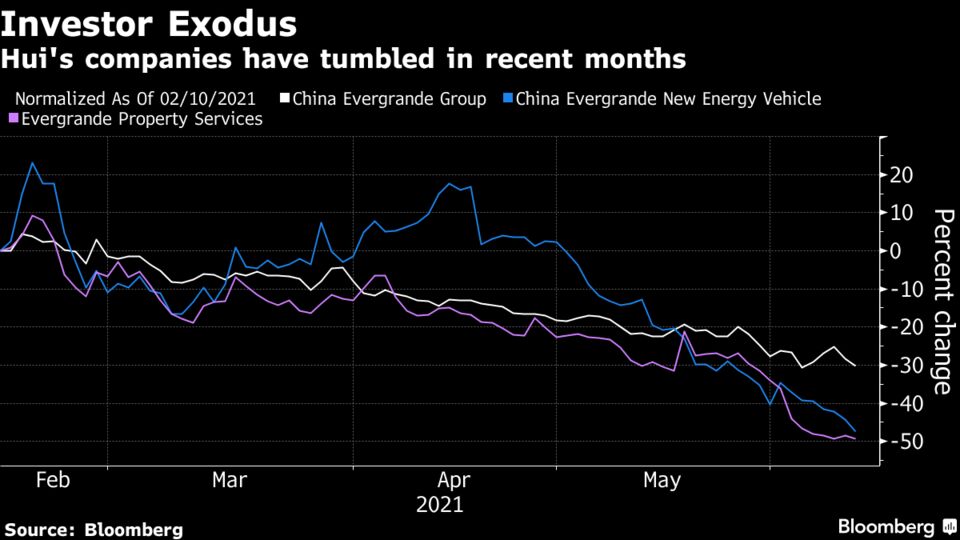RATLAND ON THE BRINK OF FINANCIAL COLLAPSE
Evergrande Tycoon Loses $20 Billion as Investors Revolt
- Hui Ka Yan’s net worth has tumbled by half from peak
- Company says it’s paring debt, defends use of discounts
Just eight months after celebrating a narrow escape from financial disaster, Chinese billionaire Hui Ka Yan finds himself back in crisis-fighting mode.
Resurgent concerns about the health of China Evergrande Group, Hui’s flagship property company, have pushed its stock to within a hair’s breadth of the lowest level since March 2020. Bondholders are rushing for the exit too, spooked by missed payments at the developer’s affiliates and a report that regulators are probing Evergrande’s ties to an obscure bank in northern China.

Enjoying Bloomberg Wealth?
To read more articles based on your personal financial goals, answer these 3 questions that will tailor your reading experience.
It’s yet another dramatic turn of events for a tycoon whose ups and downs are extreme even by the standards of China’s volatile markets. At $19 billion, Hui’s net worth has tumbled by about a third since he clinched a deal with investors to avert a cash crunch in September. It’s down by more than half from a 2020 peak, according to the Bloomberg Billionaires Index.
The turmoil has the potential to spread much wider. With 1.95 trillion yuan ($305 billion) of liabilities -- including dollar bonds that sit in portfolios from Hong Kong to London and New York -- Evergrande is the world’s most indebted real estate company and one of the most systemically important borrowers in China.
If Hui fails to revive investor confidence, a liquidity crisis could ripple through the country’s financial system and beyond. The risk has grown serious enough that Chinese regulators recently told banks to conduct a fresh round of stress tests on their exposure to the junk-rated developer.
“If it was in trouble, it clearly would have a significant impact on the Chinese housing market and the general economy,” Lan Deng, a professor at the University of Michigan who studies real estate development in China and the U.S., said by email. “Not only would it expose its lenders to greater financial risk, there could also be possible chain effects spreading across the different sectors of the Chinese economy, given how deeply the economy is tied to real estate development.”

Evergrande shares ended the day unchanged on Friday, after earlier falling as much as 2%. The company’s dollar bond due June 2025 rose about 1 cent on the dollar to 70.5 cents. Asia Orient Holdings, Asia Standard International Group and Asia Standard Hotel Group -- three small-cap Hong Kong companies that purchased Evergrande bonds after they tumbled on liquidity fears last year -- said in a joint statement that they bought $43.5 million of notes on Tuesday and Wednesday.
Evergrande didn’t respond to a request for comment on Thursday. It pledged earlier this week to arrange payment for overdue commercial paper at its affiliates and has said its dealings with Shengjing Bank Co., a lender in which it owns a stake, are compliant with Chinese law.
The developer has defended its use of sales discounts on certain properties and this week resumed buying back shares, snapping up about HK$475 million ($61 million) worth since Monday. It plans to meet at least one of China’s key regulatory borrowing limits for real estate companies -- known as the “three red lines” -- by the end of this month.
Hui has options as he tries to put Evergrande on a sounder financial footing. His empire has raised billions of dollars in recent months by selling equity in its property management arm and electric vehicle unit, which is more valuable than Nissan Motor Co. despite having yet to sell a single car. Evergrande has several other units that could be candidates for listings, including its bottled water affiliate and an online home- and car-sales platform.
Evergrande Listing Candidates
Source: Bloomberg, company filings
It’s also benefiting from a buoyant Chinese property market, said Maggie Hu, professor of real estate finance at the Chinese University of Hong Kong. The company took in nearly 52 billion yuan of cash in May as contract sales climbed 6%. It can free up even more cash by slowing land acquisitions and offloading some investment properties and tourism assets, said Edwin Fan, a director at Fitch Ratings.
Evergrande’s fate may ultimately depend on whether Chinese authorities allow banks to keep funding it. As much as 81% of the company’s debt due in 2021 is in the form of bank loans, according to Bloomberg Intelligence analyst Kristy Hung.
No comments:
Post a Comment